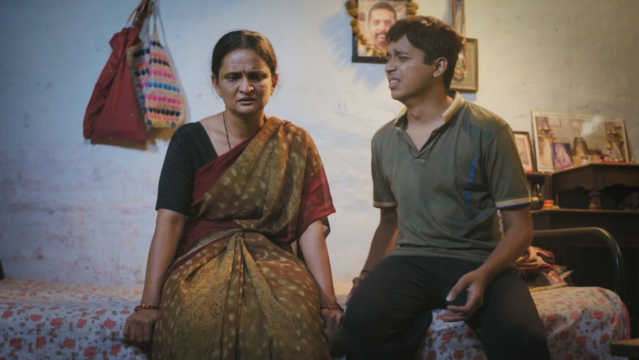
Keyur Seta
Mumbai, 04 Jun 2018 19:30 IST
The film, revolving around a brave mission, could have been much more convincing, however.

The 17th century Maratha warrior king Shivaji is almost deified in Maharashtra today. So it is quite surprising that there are not many live action films on his life or his achievements in Marathi.
First-time director Digpal Lanjekar’s Farzand tries to fill this void. How far he succeeds will be clear later. But the film is worth a dekko for those wanting to learn about an important chapter from Maratha history.
Farzand begins with the fall of Tanaji Malusare (Ganesh Yadav), one of Shivaji's foremost generals, while capturing Kondana fort near Pune from a Mughal garrison in 1670. The fort was renamed Sinhagad by Shivaji in memory of his aide.
Three years later, the mood in Raigad, Shivaji's capital in the Sahyadri mountain range in the Konkan, is one of celebration. Shivaji is to be crowned king. But Shivaji (Chinmay Mandlekar) himself is not enthusiastic. He believes the coronation would be meaningless if he is unable to secure the boundaries of his kingdom and provide peace and security to his people.
The sore point: Panhala fort, near Kolhapur, at the southern limits of his kingdom, is still under the command of a particularly cruel general, Beshak Khan, of the Adilshah of Bijapur. Khan was earlier with the Mughal army at Sinhagad and, according to the film, responsible for killing Tanaji by deceit, a twist to drive the story along. (It's a good thing the filmmaker mentions in his disclaimer right at the beginning that Farzand does not claim to be historically accurate.)
Khan's forces harass the peasantry in the surrounding villages. But what rankles Shivaji more is that an attempt under his own leadership to retake the fort in 1666, which he had held briefly in 1660 after killing the fearsome Adilshahi general Afzal Khan, had failed miserably, and the misadventure had cost the lives of more than 1,000 of his soldiers.
After consulting his advisers, Shivaji zeroes in on one of his bravest generals, Kondaji Farzand (Ankit Mohan), for the mission. Farzand was mentored by Tanaji, setting the stage for a tale of revenge.
To Shivaji's surprise, Farzand asks for only 60 handpicked soldiers for an assault on the fort that houses a 2,500-strong Bijapur garrison. The Marathas receive able support from the fabled spy and impersonator Bahirji Naik (Prasad Oak), a tamasha troupe member and informer Kesar (Mrunmayee Deshpande), and others.
Though the film's protagonist is Farzand, the story revolves around Shivaji, and hence it was vital to get his character right. Mandlekar plays him convincingly. Despite being a warrior, history suggests there was a sense of calmness and stoicity in Shivaji, and these traits are brought out well in the film.
Farzand has a runtime of 155 minutes, but the slick screenplay does not let you feel the length except at certain points, like when the general's handpicked troops are preparing for the assault. The film has a few commercial elements thrown in and some humour as well. Prasad Oak’s spy Bahirji Naik deserves a mention. His disguises fool most of the people on and off the screen, with only Shivaji usually able to see through his act.
The recreation of the bygone era is quite convincing. This is not a surprise, given that ace art director Nitin Chandrakant Desai is the production designer.
Unfortunately, the film still falls short on some counts. The all-important battle scene at the end is far from convincing. Farzand and his band of 60 warriors are supposed to be pitted against 2,500 soldiers. But in the actual scene, you find just a sprinkling of enemy soldiers and the mission ceases to appear difficult. Did the production team run short of extra actors?
Also, the characters of the enemy generals lack depth, making them out to be silly caricatures like villains from potboilers of the 1980s. This is something most Indian historical films and plays continue to be guilty of.
The technical areas are also a big letdown. In a war film, the action and stunt sequences must be top-notch, but that is not the case here. The fight sequences are lazy and clumsy, and the background fighters are clearly faking it. In one scene, a sword is seen slashing several inches away from its target.
The VFX, too, is not in keeping with the times. The camerawork would have been better if the overuse of aerial shots had been curbed. The background score generates the right effect but is too loud at times. But a couple of the songs are quite good and stick in your mind, particularly 'Shivaba Malhari'.
Farzand works well at the level of performances. First-timer Ankit Mohan (known for his work in Hindi TV serials) plays the lead with conviction. His muscular physique goes well with the character and he shines in the action sequences, though it sometimes appears as if the scenes were choreographed only for him to display his muscles. Chinmay Mandlekar displays the right temperament and is convincing as Shivaji.
Prasad Oak is brilliant as he sneaks into different characters as the impersonator Bahirji Naik. Mrunmayee Deshpande gives a glimpse of her talent but hers is one of the few roles that lack logic, as a tamasha dancer suddenly metamorphoses into a swordfighter. Mrunal Kulkarni delivers a mature act as Shivaji’s mother and inspiration, Jijabai.
Sameer Dharmadhikari, who plays Beshak Khan, is a much better actor than you might guess from this film. Pradhuman Singh, known for his Osama bin Laden act in Tere Bin Laden (2010), also comes across as a one-dimensional character. He plays Daulat Khan, the lecherous and dim-witted brother and deputy of Beshak Khan. Astad Kale, Ganesh Yadav as Tanaji, and some others provide adequate support.
Lanjekar has clearly tried to incorporate elements from Hollywood and modernize his historical by including a romantic angle between Farzand and his wife, a running comedic rivalry track between Farzand's aides, and such other elements. But the wait for a film that looks at Shivaji as a great strategist, political leader and unifier rather than as divinity continues.
You might also like

Review Marathi
Samaira review: This well-intentioned travel drama suffers from a dull script
Actor Rishi Deshpande's directorial debut doesn't rise as much as its performances. ...

Review Marathi
Goshta Arjunchi review: Triggering conversations about mental health
Anupam Barve’s short film urges people to talk to their families about what they are going...

Review Marathi
Ekda Kaay Zala review: Sumeet Raghvan impresses in a film that does not use its full potential
Directed by Dr Saleel Kulkarni, the film has a fine act by child artiste Arjun Purnapatre....

